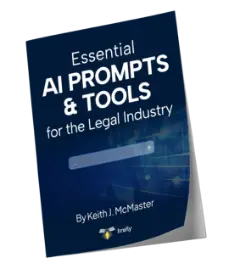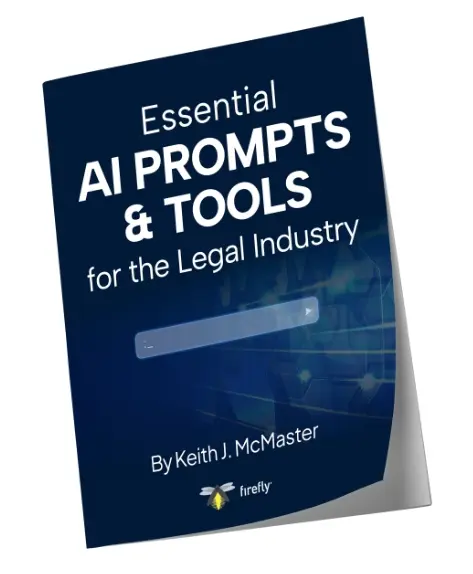Artificial Intelligence (AI) is helping to guide the future of every industry, in every sector, and legal services is no exception. If you’re an attorney, chances are that you’ve already begun to use AI as a legal support assistant. Monotonous tasks that once required human labor can now be automated by AI.
Lawyers and legal support professionals, like paralegals and private process servers, can use AI to increase their efficiency and productivity. AI in legal services can be an extremely helpful tool that provides innovative solutions and may transform the way the legal industry functions.
AI has the potential to enhance everything from legal research to service of process to skip tracing. Let’s take a look at how AI can be implemented in legal services, the benefits and drawbacks of using AI, and its key innovations that could shape the future of the legal services industry.

What do legal services include?
Legal services include the professional advice, counsel, and representation of attorneys. However, the industry’s umbrella covers support services as well, including (but not limited to):
- Court Filings: Efficient management of filing all necessary paperwork with the courts (both electronically and in person) before deadlines. Attorneys often rely on a legal services firm to handle all court filings.
- Document Retrieval: Case research often requires the retrieval of documents like public records and case files.
- Legal Research: Investigating case law, legal precedents, statutes, and other legal situations that can help to strengthen a case.
- Process Serving: When an attorney partners with a private process server to deliver any subpoenas, summons, complaints, and other document deliveries.
- Skip Tracing: Skip tracing is the use of legal tracking methods like public and private database research and tracking locations through social media accounts like Instagram or Facebook.
Nationwide industry leader Firefly Legal provides attorneys with legal services including court filing, process serving, skip tracing, and additional support services.
Types of AI used in legal services
Utilizing AI in legal services can automate mundane tasks, increase accuracy and productivity, and improve efficiency. Numerous types of AI can be used by attorneys and legal support professionals alike.
The types of AI used in legal services include:
- Computer Vision AI:
- Computer vision allows AI to “see” and conceptualize electronic data such as videos and images. This tool is ideal for document retrieval, document scanning, and text extraction.
- E-Discovery Software: AI-powered e-discovery software is made specifically for the legal industry. This tool automates the process of analyzing, collecting, and reviewing electronic legal data, and can help legal professionals quickly find pertinent data.
- Generative AI: Chatbots such as ChatGPT or Claude, and AI virtual assistants can provide real-time support, answer clients’ questions, and schedule meetings.
- Predictive Analytics: Predictive analytic tools use AI to review historical data and forecast future events. Attorneys might use this AI tool for work like case strategies, risk assessment, the calculation of damages, and settlement negotiations.
- Robotic Process Automation (RPA): RPA software is created to allow AI to automate repetitive tasks like contract review, document filing, and data entry.

The benefits of AI in legal services
AI innovations are transforming legal services and offer numerous benefits for attorneys, process servers, and more. The benefits of AI in legal services include:
- Data Driven Insights: Using AI for predictive analytics can help attorneys formulate case strategies and can help process servers to quickly locate intended recipients of legal documents.
- Efficiency: AI automation can help provide real-time case updates, increase process server efficiency, and take care of routine, time-consuming tasks.
- Improved Accuracy: AI reduces the chance of human error in document review and data entry.
- Increased Customer Service: AI can answer client questions and provide real-time case information and status updates.
- Reduced Costs: Automating tedious tasks can help you eliminate some human labor and avoid the need for human input in menial tasks, thereby reducing your overall costs.
The downsides of AI in legal services
Although AI in legal services can be extremely beneficial, it’s not a cure-all, and it does make mistakes. For example, in the widely reported 2022 case of Mata v Avianca, the plaintiff’s counsel used AI to cite cases in a filed “Affirmation of Opposition”…cases that did not exist, but that ChatGPT fabricated.
Generative AI should never be used as a sole source of information and although hallucinations are more rare than in 2022, chatbots do not always provide truthful answers.
Other downsides of AI in legal services include:
- Bias and discrimination
- Cybersecurity concerns
- Data privacy
- Ethical questions about data protection and privacy rights
- Job displacement for legal support professionals
- Inability to build client relationships
- Inability to understand nuance
- Lack of existing AI regulations
- Lack of human judgment and experience
- Overdependence on AI

How AI will impact the future of legal services
As key AI innovations continue to evolve, AI’s transformative role in legal services will grow. The technology’s beneficial and detrimental impact will continue to affect everything from document review to document delivery to legal strategy.
Future trends in AI for lawyers
Lawyers can expect to see more advanced and specialized AI tools integrated into everyday legal work. Some future trends in AI for lawyers might include:
- AI Ethics Advisory Tools: AI-driven ethics programs that help lawyers navigate the ethical questions of implementing AI, and that can flag inherent AI bias and discrimination, are continuing to gain traction.
- AI-Driven Research: AI will continue to make strides in precise legal research, with AI tools specifically geared toward the legal services industry providing relevant case law more quickly. Hallucinations, while still a problem, will continue to decrease.
- Smart Contracts: Self-executing smart contracts are becoming an increasingly popular option as they have contractual terms written directly into code. Smart contracts are stored on a blockchain and programmed for a variety of contractual needs that cut out the need for an intermediary.
- Virtual Courtrooms: Virtual courtrooms have been on the rise since the COVID-19 shutdowns in 2020. AI can help facilitate seamless digital court appearances and efficient case management.
AI trends for process servers
The future of AI for process servers looks bright, too. Technology is already vital for successful document delivery, and AI tools can be utilized to increase the efficiency of a process server. Innovative approaches to future AI use include:
- Automated Records and Filings: Real-time data entry and records of service attempts can allow a process server to spend more time on locating and serving an intended recipient, and filing successful service, rather than on detailed paperwork.
- Biometric Identity Verification: Verifying the identity of an individual being served with AI biometric tools can reduce the chance of misidentification and recipients’ claims of no service.
- Enhanced Compliance: AI tools can help a process server to closely adhere to compliance requirements by flagging any service details that might fall outside of legal regulations.
- Smart Skip Tracing: AI GPS tools can help a process server efficiently locate an intended recipient. AI software can quickly cross reference data bases to track a hard-to-find individual, too.
- Virtual Service of Process: In the future, virtual service of process might continue to remove the need for in person delivery. E-service already exists, but is considered a last option after unsuccessful delivery attempts. E-service is also subject to state and municipality regulations.
For attorneys, embracing AI’s role in legal services means greater accuracy, efficiency, and insight. However, full reliance on AI can and will lead to challenges. For legal support providers, AI enhances the ability to deliver faster, smarter, and more reliable service.
Firefly Legal is your nationwide premier legal services partner. Join our satisfied clients nationwide and partner with us to efficiently take care of your legal document delivery and additional legal support service needs.
Book a call with Firefly Legal today.






